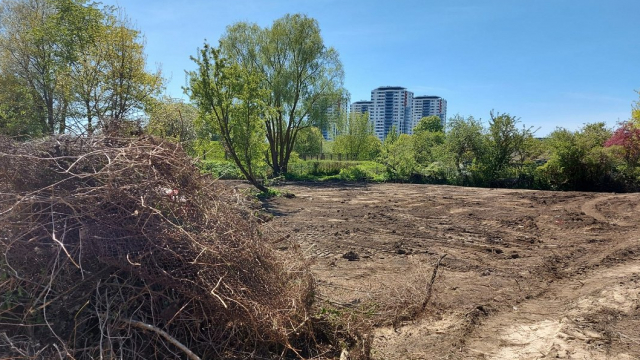If plans had been implemented accordingly, several new streets would have been available in the Skanste neighborhood for a year now, a large park with ponds to help collect rainwater, playgrounds for children, and a skatepark. 10 million euros have already been invested in the site, but the works are stalling for the second year. There was a commitment a year ago to resume construction work, but that didn't happen.
“The story of the failure of this project began, I think that in one respect, with the chosen builder, because the initial price that won was very low, and funding was lacking all the time,” Ilze Purmale, director of Rīga City Development Department, told LTV. “Then it all gradually ballooned, where all the design issues then came to light, then the pollution, the remediation that was still in addition.”
The revitalization project was prepared six years ago, with the first construction contract signed in March 2020. At the time, the private investor was thinking about building a concert hall in the neighborhood, so it was a task to schedule underground communications to a greater depth than usual.
The concert hall's conception is no longer topical, but the solutions chosen proved inappropriate for the swampy site, and the structures began to sink.
Experts estimated that the settling could be up to 80 centimeters deep. This is why last autumn it was decided to leave problematic areas for consolidation or allow them to sink until the process stops. Tidying up the site for these purposes will cost around two million euros, but in a few years, underground pipe networks and pavement will be relaid. In the rest of the park, the works were decided to go ahead.
“If we take into account that the communication of the engineering networks, which we cannot use, is one million euros, and consolidation [..] is also around two million. It is already at least three million euros, which we are currently in a loss position, which should not have been there,” said Inese Andersone, deputy of Rīga City Council, head of the development committee (New Unity).
The exact amount of the damage will still be calculated to bring an action for damages to the court.
Who's to blame? Since the builder “RR-Eko” has pointed to the designer and the designer “BRD project” to the builder, the City Council has ordered several expert opinions.
“At this point yes, the [designers] believe it is the builder's fault, the builder believes the designers' fault. That's how we point fingers here,” said Purmale. “Obviously, it's going to be the court's job to sort everything out by those expert opinions, by the expert's findings, how much each is to blame for this whole situation.”
Works in the rest of the area, including part of the park, were already decided to resume last year, but it was not done. It turned out that the builder at the time was not getting a bank guarantee. Subsequently, this spring the municipality found another – the association Novacon Industries – in a restricted tender, but its member (LNK Industries) was involved in a construction cartel case and the Competition Council advised the municipality not to enter into a contract. A new procurement followed, and a third contractor was found for the site – ACBR. Its parent company (A.C.B.) is linked to a road building cartel, but it is permitted to enter into this contract on the basis that it has been found guilty and has been working on restoring trust. All of this has taken more than a year overall.
During this time, weeds grow in Skanste and installed equipment ages unused.
“We jump onto the last train, of course, in the hope that those carriages really take us there in time,” Purmale said.
The rush is also due to the fact that European funds money has been raised for the site, which can only be used by the end of the year. As it is clear that this will no longer be done in full, it has been agreed with supervisors to change the status of the project, which allows it to be completed by October next year without losing the support of funds already invested. This deadline is also firmly set. On the other hand, the missing nine million euros will have to be borrowed to complete the work. In addition, taking into account the change of status of the project, a positive vote by the Rīga City Council is now needed in order to revive and complete Skanste Park.
“Of course, colleagues have a lot of questions. I too have a lot of questions, of course, because this is … and this is not an issue where there is a choice between a good and a bad option, but the lesser of the two evils,” believes Rīga City Council Chairman Vilnis Kirsis (New Unity). “However, it is quite irresponsible to leave that project halfway, lose European money, and leave something unfinished in this area, which is a priority area in Riga's development plans.”
The Skanste project will be decided on at the Council meeting next week. The total cost of the project is currently estimated at EUR 19.5 million, but has already reached EUR 21.5 million. Moreover, Rīga had initially foreseen that €7.9 million of all costs would be borne by the ERDF, it is now clear that even in the most successful scenario, at least €3 million of the planned aid will not be available. The City Council plans to borrow nine million euros to continue the project, as long as deputies support it.






























